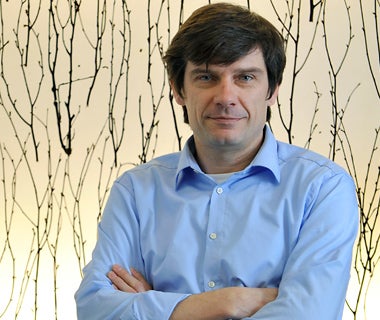
Getting a view of the big picture when banks make decisions
Waterloo prof studies the environmental and social impact of the financial industry.

Waterloo prof studies the environmental and social impact of the financial industry.
By By Sam Toman Faculty of the EnvironmentWhen thinking about industries that affect the environment, banks may not leap to mind.
 But when you consider that banks can choose to finance oil sands development or solar farms, the relationship becomes clear. And it flows both ways: if a bank holds contaminated land as collateral, it can be held liable for cleaning it up.
But when you consider that banks can choose to finance oil sands development or solar farms, the relationship becomes clear. And it flows both ways: if a bank holds contaminated land as collateral, it can be held liable for cleaning it up.
Olaf Weber, a professor in the School of Environment, Enterprise and Development (SEED), is helping to pioneer global thought and policy on the interactions between environment, social justice, and finance. As the Export Development Canada Chair in Environmental Finance, his achievements include:
Weber is currently working on developing guidelines to integrate environmental and social factors into project financing decisions. He wants banks to be able to assess whether investing in a mine, for example, will result in more jobs or a loss of jobs for a local community.
Green funds
More generally, Weber researches how financial institutions can support sustainable development. “Green” funds, for instance, can influence the share price of companies whose activities may have a positive effect on the environment. On the flip side, people who buy into traditional mutual funds can end up supporting companies whose practices they dislike.
Weber also studies “impact finance,” which supports “specific projects that help people,” he says. “There are projects internationally and also in Canada that help people find jobs or that support farmers, for instance.”
Particularly in the developing world, microfinance loans can help people start businesses and lift themselves out of poverty. Unlike traditional aid, it helps build skills rather than create dependence, he says.
Weber says he’s glad he has come to a university where environment and business are so intertwined.
“It’s good. It makes more sense than the pure business perspective.”

Read more
An ambitious research collaboration with Habitat for Humanity is reimagining home ownership across Waterloo Region and Canada

Read more
Here are the people and events behind some of this year’s most compelling Waterloo stories

Read more
Researchers awarded funding to investigate ecology, climate change, repatriation, health and well-being through cultural and historical lens
The University of Waterloo acknowledges that much of our work takes place on the traditional territory of the Neutral, Anishinaabeg, and Haudenosaunee peoples. Our main campus is situated on the Haldimand Tract, the land granted to the Six Nations that includes six miles on each side of the Grand River. Our active work toward reconciliation takes place across our campuses through research, learning, teaching, and community building, and is co-ordinated within the Office of Indigenous Relations.